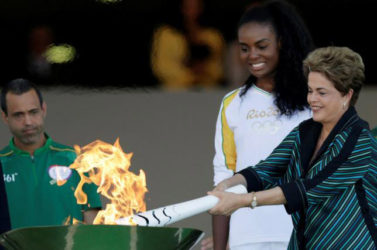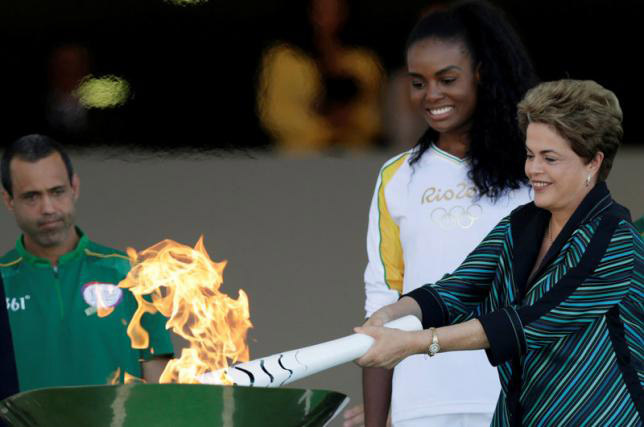BRASILIA, (Reuters) – President Dilma Rousseff lit the Olympic torch in Brazil’s capital yesterday and pledged that political turmoil engulfing her nation would not harm the first Games to be held in South America.

The Olympic flame was flown into Brasilia on Tuesday to start a three-month relay through more than 300 towns and cities that will end with the opening of the 2016 Games in Rio de Janeiro’s Maracaná stadium on Aug. 5.
A smiling Rousseff waved to crowds as she lit a green cauldron with the Olympic flame on the ramp of Brasilia’s modernistic Planalto presidential palace.
The president, who is facing impeachment proceedings, will likely be removed from office before the opening ceremony in Rio.
“Even though we are living through a truly critical period in our history and the history of our democracy, Brazil will know how to offer athletes and visitors the best welcome at theOlympics,” she said.
Rousseff said the sports facilities in Rio and the security measures to protect athletes, tourists and visiting heads of state were ready.
Brazil has scrambled to prepare for its second global sports event in two years in the midst of the worst recession since the 1930s and a massive corruption scandal that shook the political establishment and fueled demands for Rousseff’s removal. Brazil is also fighting an outbreak of the mosquito-borne Zika virus that threatens to keep some athletes and tourists away from Rio.
The Olympic flame, burning inside four golden lamps, arrived in Brasilia aboard a LATAM Airlines jetliner that was escorted inside Brazil’s airspace by two Brazilian Air Force F-5 fighters.
The torch left the presidential palace carried by Fabiana Claudino, who led Brazil’s female volleyball team to a gold medal in the 2012 Games.
Hundreds of cheering Brazilian lined the streets at the start of the relay and an Air Force aerobatics team swooped over central Brasilia.
Some 12,000 torch bearers will carry the flame across South America’s largest country. In Brasilia, they will include a refugee from the Syrian civil war, 12-year-old Hanan Daqqah, who arrived in Brazil with her family in 2015.
Torch bearer Gerard Moss, a Swiss-Brazilian aviator and environmentalist, said the Games could help to calm political tempers.
“What Brazil most needs now is unity, the very symbol of the Olympics,” he said before his turn in the relay. “This is an opportunity to reduce tensions between our political parties and get on with the rebuilding our economy.”
While torch bearers carried the flame around Brasilia on Tuesday, a senate committee debated whether to put Rousseff on trial on charges of breaking budget laws, filed by the lower house of Congress two weeks ago.
Rousseff is likely to be suspended next week when the Senate votes on opening the impeachment trial. Vice President Michel Temer would replace her during a trial of up to 180 days, and guide the country to elections in 2018 if she is removed from office.
Officials in her government admit her ouster is imminent. Rousseff said she hoped the Games would bring goodwill to her troubled country. “We will infect our country with the Olympic spirit,” she said. (Reporting by Anthony Boadle and Lisandra Paraguassú; Editing by Jeffrey Benkoe and Alistair Bell)

